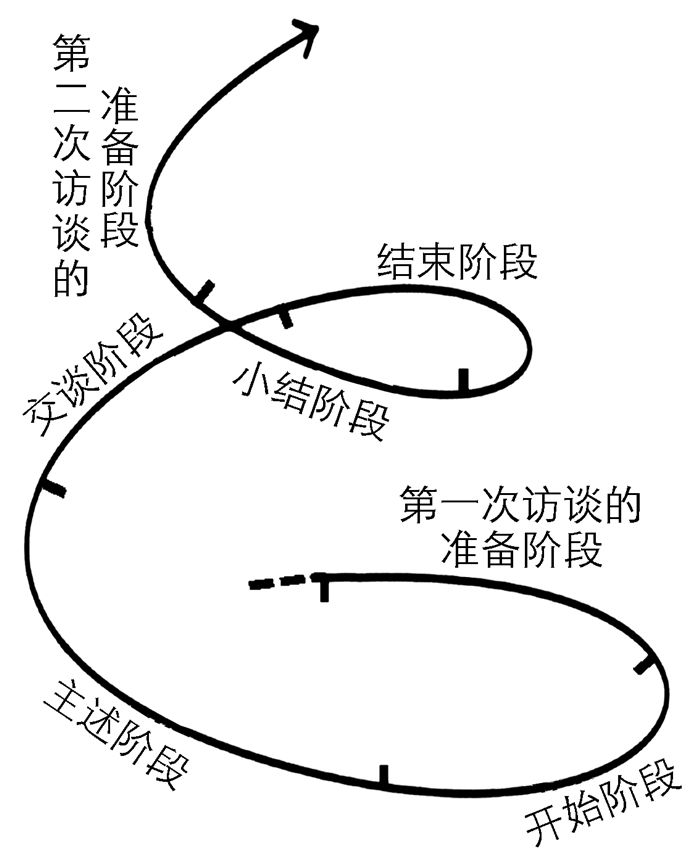-
党的十九大报告指出"不断满足人民日益增长的美好生活需要,不断促进社会公平正义,形成有效的社会治理、良好的社会秩序,使人民获得感、幸福感、安全感更加充实、更有保障、更可持续",并对此作出了重要部署。一门学科的使命与国家富强、民族振兴、社会和谐、人民幸福紧密相关。无论是基础理论研究抑或是对社会现实问题的考察,心理学的核心宗旨都是探寻心迹,理解人生,增进人类福祉和安康。社区心理学作为心理学大家庭中的一员,肩负着重要的责任和义务,"探寻和谐社区建设的心路历程,促进社区居民的幸福进取精神,预防社区中的问题行为"[1],是社会心理服务体系的重要组成部分。从中国社区实际出发,建设中国特色社区心理学理论体系是社区心理学研究者们一直以来的希冀与实践。随着中国心理学会社区心理学专业委员会暨中国社区心理学服务与研究中心的成立,研究者们逐步开展了一系列社区心理学相关研究。然而,随着研究的逐步推进与深入,研究者们愈来愈感受到传统心理学研究方法在社区心理学研究上的局限性以及中国社区体现出明显的社会文化历史特色。由此,我们发展出一种新的社区心理学研究范式载体——开放式主题访谈(Open Thematic Interview)。本文将重点阐述这种范式载体的缘起、特征、程序及优势,阐明这种范式载体在创建中国特色社区心理学中的作用和启示。
全文HTML
-
近些年来,我国的社会、经济、政治、文化、科技等各个方面取得了长足进步与发展。但我们必须清醒地认识到,我国社会正处于社会转型和社会心理变迁的特殊历史时期,所累积的个体心理健康问题及社会矛盾、冲突、争端等社会心理问题日渐凸显[2]。特别地,伴随着城市化进程、市场经济转型、房屋重建导致的大规模搬迁、农村剩余劳动力转移等形势,我国的社区建设可能面临着居民参与度低、社区归属感低、人际关系冷漠、社会资本缺乏等一系列阻力[3]。社会转型和社会变迁过程中产生的种种心理问题在各个层面(不仅在社区层面)伺机潜伏或集中爆发,急需要发挥心理学在国家社会发展中的重要作用[4-7],对发展过程中出现的相关心理现象和问题予以回应和解答。从实用主义观点出发,心理学的研究目的并非是要获得一种与人类经验无关的抽象真理,而是要更好地理解社会心理现象,为人类福祉作出应尽之责[8]。但传统学院式心理学将实验室研究结果转化为实践运用的不够充分,这在很大程度上影响了心理学的实践效能。心理学要发展必须走向大众,走向社区,走向更具生活气息的场域,更多地投入社会现实生活,这样才能为学科争取进一步生存与发展的空间和机会。心理学如何走向大众和走向社区呢?最直接的途径就是去社区做访谈,取之于民而又用之于民。心理学研究方法有量化研究与质性研究之分,质性研究方法多种多样[9-10],其中访谈是质性研究中使用最为广泛的数据采集方法,因为它与许多资料分析方法是相容的,较其他方法操作过程相对"容易",而且最适合人们通过语言来理解生成的意义[11]。我们在访谈的基础上发展出一种新的范式载体,即开放式主题访谈。它的社会性、生动性、鲜活性让研究者走出实验室,回应时代需求,解答现实问题,为国家和社会发展服务提供新的参考。
-
就学科性质而言,社区心理学是一门人文学科的心理学,它关注活生生的人的"生活世界"(包括"心理世界")。社区心理学一方面所关注的人与其人生紧密相关,与其人生追求、人生态度、人生智慧、人生修养等密不可分;另一方面所研究的社区与其社会历史文化紧密关联,与其社区价值观、社区文化习俗、社区建设历程等联系密切。以探究物理世界的自然科学方法来直接探究复杂多样的社区心理现象合适吗?答案显然值得怀疑,因为社区中的人生活在一个具体的、历史的、现实的社区系统之中,与现实生活有千丝万缕的联系[12]。社区心理是一类非常复杂的心理现象,越复杂的心理现象受社会文化的影响越明显,传统自然科学研究方法不能够或难以全面地描述和解释复杂的社区心理现象,需要创新研究思路。自科学心理学诞生伊始,不同学派的心理学家就从多种不同的角度对复杂多样的心理现象给予了相应阐释,至今形成了七大研究取向[13]。而且,近些年来随着学科间和学科内的交流对话不断增加,为从不同角度看待心理现象提供了新的路径。这些都启发我们可以从不同的角度来探究和阐释社区心理现象,了解其多样性和复杂性,也能更进一步理解现象所承载的社会历史文化属性。我们发展出的开放式主题访谈符合这一需要,访谈前、中、后期的开放性可从不同的角度看待社区心理现象,从而得到新的、意料之外的意义和经验的生成。同时,开放式主题访谈除了用于探索社区心理现象本身的多样性和复杂性外,它对于建设中国特色社区心理学也大有裨益。对于处于起步阶段的中国社区心理学而言,急需一种新的视角的介入来识别和探索新时代背景下我国社区实际建设和发展过程中相关的心理学概念和课题,立足于中国社区实际,认识中国社区的社会历史文化特色,以丰富社区心理学领域相关的理论和实证资料,从而努力构建起中国特色社区心理学的理论体系。可见,开放式主题访谈是发展中国特色社区心理学之必需。
-
在人才成长上,急需方向上的指引。其一,质性研究和量化研究之间的分歧或者说研究的张力由来已久[14]。从一定程度上讲,整个心理学界都存在着"重量化、轻质性"的研究趋势,量化研究占据着心理学研究的主导地位。但不可否认的是,囿于这种主导地位的限制,那些难以有效客观度量和解答的心理学问题被搁置了,而这些问题通过质性研究途径可以得到较好的解答。回顾早期心理学家弗洛伊德、奥尔波特、皮亚杰、巴特利特、维果斯基等都曾做过质性研究[15]。费斯汀格、米尔格兰姆、津巴多、吉利根等当代心理学家也都曾用过质性研究方法[16],质性研究是心理学研究方法中不可或缺的一部分。通过质性研究,研究者可以对那些难以度量的心理学问题进行探究,从而扩展心理学的研究内容。开放式主题访谈的提出增进了对质性研究的理解以及丰富了质性研究的方法类别,便于社区心理学研究者使用,拓宽了研究者的学术视野。其二,目前参与社区心理学研究的人数有待增加,对于那些想要参与社区心理学研究却不知怎样进行社区心理学研究的人而言更需要一种方向上的引导。通过去社区做访谈了解居民的所思、所感、所行,切实体会现实生活中人的心理与行为,从而激发起研究者自身的研究兴趣与动力,这样参与社区心理学研究的人才会越来越多、茁壮成长。其三,由于传统心理学研究对参与社会实践不够重视,学究式教学培养出来的心理学人才与社会现实需求往往是"脱节"的,难以充分满足社会实践的现实需求。所以,需要打破这一僵局,让学生深入实践,在实践中学习成长,将理论研究与实践应用紧密结合起来,从而为社区建设输送优秀人才。开放式主题访谈为中国社区心理学人才健康成长提供一种新的培养渠道,是人才成长的重要条件。
概言之,心理学为国家社会发展服务,发展中国特色社区心理学以及中国社区心理学人才健康成长的需求催生了这种社区心理学研究范式载体,它的提出是我们一直以来的初衷和反思总结。下面将具体阐述这一范式载体的相关内容。
一. 急心理学为国家社会发展服务之所急
二. 发展中国特色社区心理学之必需
三. 中国社区心理学人才成长之必需
-
在中国社区心理学诞生之初,我们翻译出版了《社区心理学译丛》一套十本,出版了《社区心理学》集刊,陆续对复杂多样的社区心理现象进行了一些探索。我们发现前人的研究虽然相当丰富,但采用的方法存在局限或者说只是涉及社区心理现象的很少方面。因此,拓宽视野,采用不同研究途径(例如,亲身到社区中去)从不同方面入手,以探索复杂多样的社区心理历程以及新近涌现的社区心理学概念是我们的当务之急。
2018年8月至11月,我们分别去到贵阳、遵义、重庆、绍兴等地对多位社区工作者进行了访谈,征求他们对《社区心理学》教科书的构建思路和主题的意见,取得了一定的收获[17],此次访谈中我们摸索使用新的研究方式进行访谈。后来,几经酝酿,反复讨论,我们越来越觉得这种新的研究方式适用于现阶段我国的社区心理学研究,适合于研究复杂多样的社区心理现象,很有必要再到社区去实践应用。因此,我们于2019年7月1日至20日采用这种新的研究方式对重庆市、成都市、安阳市、南京市、苏州市、湖州市、诸暨市等城市的17个获得省或市或区级表彰奖励的优秀社区、农转非社区、公租房社区、一般城市社区、农村社区等进行了调研。通过此次访谈,我们对这种新的研究方式更有信心了。
-
开放式主题访谈是一个描述性概念,是指以访谈者与受访者的关系为其结构,以访谈主题为其探访核心,来了解社区心理普遍联系特点的范式载体。它的显著特征是开放性,这是由社区心理学的研究对象—社区心理所决定的。社区心理是一个具有普遍联系的复杂系统,要了解这个系统,访谈者提出的主题必须是开放的,不设限的,是多种多样的(如调查性研究主题、关系性研究主题、发展性研究主题等)。另外,它的开放性对访谈双方而言表现在:访谈者没有预期的条件假设,访谈者是以学习者、请教者的身份与受访者进行交流;受访者亦需是敞开心扉,谈其所感、所思、所为(关于如何使受访者开放式的畅谈将在开放式访谈程序中论及)。开放的过程使得访谈双方谈论出不同于以往的新内容、新观点、新启示,进而从不同的角度去理解社区心理系统。
开放式主题访谈是一种范式载体,是一种中国社区心理学研究范式的载体。范式是一种启发思考的研究模式,是用以指导我们去访谈、观察、理解心理与行为特征的模范和框架。中国社区心理学研究范式就是从中国社区实际出发,开展中国化的社区心理学研究,努力创建具有中国特色的社区心理学,更好地为我国的人才培养和社会发展服务[18-19]。诚然,中国社区心理学研究范式下的载体是多种多样的,如常用的量表法、实验法(也设定从中国社区实际出发),但我们认为作为范式载体之一的开放式主题访谈对于正处于起步阶段的中国社区心理学是适宜的也是必要的。就目前而言,中国社区心理学的工作重心应是扎根于中国社会历史文化和中国社区实际,厘清社区心理学中已然出现以及新近涌现的概念,如责任感、进取心、宽容心、获得感、正能量等,吸收国内外研究成果合理要素(例如干部的胜任特征问题,国外研究偏重于个人和结果取向,国内研究偏重于关系和过程取向,其实对干部的要求是"德才兼备,以德为先"),构建具有中国特色的社区心理学理论体系,进而为提高社区居民的生活质量服务。开放式主题访谈着眼于访谈主题,从中国社区和社区居民自身特点出发,通过开放性把握访谈主题的个别性与整体性、表面性与本质性、历史性与时代性,从而了解社区心理的普遍联系。
-
我们提倡的开放式主题访谈有一套程序,包括六个阶段,访谈者需遵循六个阶段的基本程序和中国社区实际特点,访谈质量和结果才有保障。六个阶段不是截然分开的,呈现出"螺旋式上升"的趋势,见图 1。
1.准备阶段
访谈正式开始之前,访谈者要做好准备工作。首先,通过查阅主题相关文献,熟悉主题在中华传统文化中的有关典籍以及前人已有研究,根据社区实际确定访谈主题规划。例如,我们在准备涉及有关社区氛围、仁爱心、正义感、和谐观、文明观、诚信观等方面的主题时,应当认真准备中华文化与西方文化的主要差异及其表现。有研究表明,较之于西方文化,中华传统文化表现出如下特点:道德比法律更重要,今生比来世更重要,社群比个人更重要,精神比物质更重要,责任比权利更重要,民生比民主更重要,秩序比自由更重要,和谐比斗争有价值[20];中国文化基本精神的主体内容是天人合一、以人为本、贵和尚中、刚健有为[21]。虽然开放式主题访谈不限定具体的访谈提纲,但是访谈者一定要事先准备一个粗线条的访谈提纲,以免受访者完全偏离访谈主题。访谈者要做到心中有数,向社区居民提出哪些问题、如何提出通俗易懂的问题、如何表述才能使居民更加理解,这些都应该有所准备。然后,通过目的性抽样和方便抽样选取合适的受访者,同时辅以滚雪球式抽样(如若遇到特别不善言辞、双方完全不能理解的受访者,请其推荐身边其他合适人选),以确保受访者能提供内容丰富的信息。其次,与受访者提前约定访谈时间、时长、地点、频率、方式等,以便双方提前规划行程。最后,正式访谈之前可以进行预访谈,针对预访谈过程中产生的问题通过查阅文献、组织研讨会等提出解决方案。我们的经验是,准备越充分,越有利于开放式主题访谈取得良好成效。
2.开始阶段
访谈开始之初,访谈者要向受访者简要地介绍自己,就语言使用、交谈规则、自愿原则、保密原则和访谈记录方式等问题与受访者进行磋商,以符合访谈研究的伦理规则。当告知了这些基本信息之后,便开始进入访谈。开始时尽量活跃气氛,从日常生活中最细微、最普通的方面入手,比如从社区外观、社区好干部、家常、天气、重要节日等引出话头,询问受访者一些基本日常生活状况,"您住在这个社区多少年了,您觉得这个社区怎么样?""今天天气很好,平时天气好的时候社区都举办什么活动?""您这个社区真不错,我们是来学习的,你们有什么好的经验值得分享吗?",目的是营造一种宽松、自由、和谐的气氛,拉近与受访者的关系,以便受访者放下心中芥蒂主动与访谈者交谈,引起情感上的共鸣。访谈者与受访者建立和谐的、融洽的关系是顺利开展访谈的基础和前提,访谈者要尽力避免社会因素的干扰,以学习者、请教者的身份向受访者请教,但又不要表现得过于拘谨,大方、自然、得体、谦虚、和蔼的态度是平衡这种关系的着力点,这一点应贯穿于整个访谈过程。
3.主述阶段
当引出话头之后,接下来就是倾听受访者自己陈述。倾听的过程同时顺势提示访谈主题,"您刚才提到的……(与研究主题相关的现象、事件、线索、载体、节点等)是什么意思?"受访者是在不知不觉中逐渐明确起访谈主题的。这是一个完全开放的阶段,访谈者应全神贯注地倾听受访者表达与主题相关的内容,要学会做一个好听众,支持受访者尽量陈述,不要随意打断。例如,学会适时地说,"这是怎么一回事?""您这么说指的是?""能不能针对您刚才讲的举个例子?""您再仔细想一想,除了您刚才讲的还有什么补充的吗?"要学会用期盼的注视去聆听。访谈过程中可能会遇到不善言辞或不愿言辞的受访者,要鼓励他们说并给予肯定,"您刚才讲的一些内容特别好,非常值得我们学习,还有其他的吗?","您刚才讲的特别有启发意义,您还有补充的吗?";遇到那些滔滔不绝的受访者,要耐心倾听,但超过一定时限要适时打断;遇到那些说得特别抽象的访谈者,要让他们尽量多举实例或者打个比喻。
4.交谈阶段
当受访者陈述主题陈述结束后,访谈者不能沉默不言,或只对受访者的陈述表示赞同,而是应当用一些希望得到回答的问题或次级主题把访谈引向深入。访谈者与受访者的互动、交谈也是完全开放的。访谈者可以就受访者没有讲到但在访谈前准备的粗线条提纲中涉及的部分内容向受访者补充请教寻求指导,但不能逐条式的询问,始终保持改进和增删问题的开放性,目的是启发受访者更多的思考;就有歧义、有异议的地方与受访者讨论;就不理解、没听清、表达不清楚的地方请受访者再解释一遍;受访者可能会向访谈者寻求迫切的帮助等等。对受访者的提问或追问尽量口语化、生活化、通俗化、时代化、清晰化、具体化,尽量避免使用专业术语,要设身处地地为受访者着想,这样受访者才能畅所欲言。切忌把交谈变成提纲式一问一答的过程,它是访谈双方积极互动、自由表达、自由理解的过程。交谈过程中会遇到一些棘手问题,如受访者完全脱离访谈主题谈及其他无关话题,要提及线索返回访谈主题;受访者就研究主题谈论的内容完全背离生活实际,要适时予以打断;受访者可能会主动询问访谈者对主题的认识,要巧妙地将话题引向受访者。作为访谈者的我们应该灵活妥善地处理这些情况,确保访谈持续下去。
5.结束阶段
访谈应该在和谐融洽的氛围中进行,如果访谈已经超过事先约定的时间、受访者已经面露倦容、访谈的节奏变得拖沓、访谈的环境正在往不利的方向转变等,应考虑结束访谈。访谈者要善于察言观色,在适当的时机结束访谈,尽量以一种轻松、自然的方式结束。访谈结束时,要向受访者表达诚挚的感谢,给予一定的物质报酬,对于受访者在访谈中谈到的实际需求给予力所能及的支持。
6.小结阶段
在一次访谈结束之后,我们要求访谈者就这次访谈的两个问题(访谈涉及主题的情况如何?访谈技巧是否有创意?)进行认真的反思总结,从而为下一次访谈奠定基础。我们认为只有在实践中不断总结经验教训才能逐渐提高访谈质量。
-
无论以何种方式记录访谈内容,最终会生成大量的文本资料,如何对纷繁复杂的资料进行梳理总结以建构理论是对研究者研究智慧的考验。在进行文本分析前,除了前文提到的典籍和已有研究外,研究者还要熟悉中国社区心理学研究的方法论原则,涉及该主题的种种心理表现。研究者必须具备高度的理论修养、理论自觉和理论自信,研究者在本领域的个人从业经验、丰富的实践性知识和深刻的个人洞见是后续理论开发的基础。在进行文本分析时,研究者可从多种不同的角度对文本进行系统分析,以解读文本资料的普遍联系,换言之,从若干方面对其作出分析,比如研究主题的形成、发展、结构、功能、影响因素等,这也是研究者理论积淀的延伸。
在不同的角度下再进行分析,表现为根据文本所反映的主题(而不是给概念贴标签)以及文本主题的性质对其进行层级分析。首先,在原始文本资料中探索寻找反映研究主题的初级主题,初级主题概括研究主题的客观事实或客观状态,通常范围比较广,内容比较多;然后,对初级主题进行梳理归纳、整合聚集、分类处理等方式提炼次级主题,次级主题是对初级主题的高一层级的概括;最后,通过对次级主题进行类属比较、关系联结、分析总结等再提炼更高一层级的主题,即核心主题,它高度概括统筹原始文本资料。这个过程中研究者可能会舍弃或合并一些主题内容。经过对资料反复推敲考虑,最终构建出相应的理论模型。对原始文本资料的分析需紧扣两项原则:一是切合中国社区实际,能反映中国社区现实情况,体现我国社区建设和发展的时代性,为社区环境建设作出贡献,例如"社区共建共享",依靠和组织居民有序参与社区治理,实现人人参与、人人尽力、人人共享的局面,这符合中国社区实际;二是与研究者的理论积淀相契合,能彰显研究者的理论素养,例如从交互作用的角度理解"社区氛围",社区居民既受到社区环境的影响,也在对社区环境施加影响,表现为一种交互的存在。
-
开放式主题访谈适用于中国社区心理学研究,它具有以下优势:(1)与一般访谈的主要区别是开放式主题访谈从中国社区实际出发,立足于中华优秀文化和中国社区自身特点,是一种中国社区心理学研究范式的载体,这不仅会形塑我们看待社区心理的方式,而且影响着我们后续如何去分析和理解与之相关的资料;(2)它的开放性使得研究者不受"本本主义"的限制,超越既有书本知识的理论藩篱,提出符合中国社区实际的社区心理学概念和理论模型;(3)社区心理是一类复杂多样的心理现象,如情操、定力、仁爱心、正义感、和谐观等,会受到社会历史文化的影响,开放式主题访谈特别适合于不宜做量化研究(实验和问卷调查)的课题和自然情景下的调查,能够提供某种社区心理的系统观点和普遍联系特征,用自己的话讲自己的故事,使研究者对社区心理现象了解得更加深入、更为全面;(4)它适用于跨时间、跨空间的比较研究,比较研究不同地理区域、行政区域、城乡区域、历史区域、生态区域等区域内居民个体心理和群体心理的共同性和差异性。我们认为,开放式主题访谈是发展中国特色社区心理学的基石。
在质性研究中,研究者们对"效度"的定义和检验问题展开了大量讨论,并一致认为质性研究的效度不论在概念定义、分类方法还是使用范畴上都和量化研究的效度很不一样[22]。质性研究的价值并不在于其结论的可推广性和普遍性,而是为某一现象的探索贡献出新鲜的、独特的、深刻的理解[23]。质性研究者们提出了不同的效度检验方法,如参与者检验、三角检验法。但这些方法的应用并不意味着研究结果真实有效,研究质量要得到保证更重要的是研究者对理论的高度自觉和反思。质性研究正在逐步形成用于评估自身研究质量的术语体系[24],Levitt,Bamberg, Creswell, Frost, Josselson和Suárez-Orozco提出了质性研究期刊论文的报告标准[25]。因此,我们认为与其他质性研究类似,开放式主题访谈提高效度、保证质量在于研究者投入高度的严谨性、自觉性、反思性并不断付出创造性的努力,检视研究过程中所有因素(研究者、参与者、访谈过程、访谈分析等)之间的关系,提供令人信服的、逻辑清晰的、思维缜密的理论结果。
一. 开放式主题访谈的缘起
二. 开放式主题访谈的定义特征
三. 开放式主题访谈的程序
四. 开放式主题访谈的文本分析
五. 开放式主题访谈的优势与效度
-
心理学主流研究的方法基础是假设-演绎法,在这种方法论的指导下,从理论提出假设来检验理论,而假设则通过实验或观察在实践中加以检验。研究目的是检验理论观点正确与否,正确则暂时保留,错误则拒绝接受。该方法依赖于由已有理论提出的假设,这就不可能提出全新的理论。"如果科学研究仅仅在于检验已有的理论,或者拒绝它们或者保留它们,那么我们在研究实践中就不可能发现全新的、出乎意料的深刻见解"[8]。而开放式主题访谈未设定理论假设,开放互动的过程使研究者有机会近距离接触受访者,深切地了解受访者的所思、所想、所行,这有助于我们理解实践中出现的新概念,对新概念有新的认知,进而有利于构建出新的理论模型。深入中国实际,从中国社区实际出发,中国化的过程中必然会产生出许多新概念和新理论。每次开放式主题访谈,研究者可能都会感受到不同的体验,这种不同的体验既是源于受访者对于研究主题的不同认知,也是研究者对研究主题逐步深入的感悟。总之,开放式主题访谈为我们探索新概念提供了一种可取的途径。
-
随着社区功能的日臻完善,社区俨然成为促进社会融合、丰富精神生活、实现人的社会化的空间场所和神经网络。研究社区生活情境下个体、亚群体、群体、组织等的心理与行为活动,激发人-社区系统的正能量,促进该系统的交互作用,进而促进整个社会的发展,这是社区心理学的价值所在。与传统心理学科相比,社区心理学的一个显著特征是它的实践性。开放式主题访谈本身就是社区心理学研究的一种实践,它走出了一条心理学为国家社会发展服务的新路,通过它我们更加确切地认识到社区心理学的实践应用价值。深入社区实际之中,与受访者直接接触,根据对情境和事件的综合解释,阐明受访者真实世界的中心主题意义,据此向社会大众展示研究中的问题,呼吁改变或者创造促成改变的条件[26]。比如在访谈过程中社区居民和基层社区干部都表达了对心理健康知识普及、心理健康教育培训、心理咨询服务、预防和治理社区中的矛盾冲突、社区矫正与社区戒毒康复、社区危机突发事件的处置等方面的强烈需求,急需更多的心理学专业人才和资金投入。社区心理学的实践应用已得到研究者们的重视,如社区心理学在组织行为研究方面的探索[27]。社区心理学的实践性不仅是为了预防和治理社区中可能产生的问题行为,更是为了促进生活在社区中的人的幸福进取精神,点燃人类心灵的真、善、美,培育积极的社区心态,将社区建设成和谐有序、绿色文明、创新包容、共建共享的幸福家园。
-
在新的时代背景下,人才培养始终是国之大事,是学科发展之大事,关乎国家和学科发展的未来。开放式主题访谈为社区心理学人才培养提供了一种新渠道,有利于中国特色社区心理学人才的成长。研究者们不必坐在实验室里"关起门来搞研究",走出书斋,深入社区实际,实地了解民生疾苦。在实践中发现问题,分析问题,解决问题。例如,傅安国等将心理学知识与脱贫攻坚问题结合起来,通过质性研究构建出世代贫困家庭的整体内生动力资源枯竭模型,为丰富减贫实践和国家提高精准扶贫工作绩效提供了理论借鉴和政策参考[28]。并且,它为研究社区心理学提供了一种新视角,研究者们明确了如何开展社区心理学研究,如何把社区心理学的"活性"做出来。它也能吸纳社会学、人类学、管理学、文化学、教育学、民族学等不同学科和专业的研究者进行广泛合作,丰富人才培养的交融性。按照《国家中长期人才发展规划纲要(2010-2020年)》要求,要把城乡社区服务人才队伍建设纳入当地人才发展规划,引导优秀人才向城乡社区服务领域流动,这为培养新时代下社区心理服务相关的科研与实务人才提供了契机,受过良好教育与培训的社区心理学人才能为城乡社区建设贡献更多的智慧,开放式主题访谈为人力资源管理和运用提供了知识路径。
-
通过开放式主题访谈,我们深切地感受到我国的社区具有鲜明的中华文化特色,既包括中华优秀传统文化,也包括现当代中华优秀文化。比如,社区随处都可感受到中华传统文化中的仁爱精神,表现为人与人之间友善相处、团结互助等;社区随处可以感受到中华传统文化中的正义奉公精神,表现为见义勇为、义无反顾等;社区中随处可感受到中华传统文化中的文明礼貌行为,表现为朴素节约、帮助老弱病残孕、遵守公共秩序等;社区中随处可感受到中华传统文化中的崇智精神,表现为和谐共处、合作共赢、崇尚教育等;社区中随处可感受到中华传统文化中的诚信精神,表现为言行一致、践诺履约等。中华民族独具特色的语言文字、精彩纷呈的文学艺术、充满智慧的哲学宗教等文化形态所蕴含的思维方式、价值观念、行为准则,无时无刻不影响着当今的中国人[21]。现代神经科学研究也表明,诸如价值观、习俗、信念等文化特质影响到多层次认知功能神经机制,人类大脑在不同文化下的心理活动表现出不同的脑机制[29]。
同时,通过开放式主题访谈,我们深切地感受到我国的社区具有自身实际特点。不同的经济基础、不同的社会制度、不同的地理条件、不同的发展模式和不同的历史文化,造就了中国社区居民独特的价值观念、生活方式、思维模式、行事风格等。受地缘、亲缘关系和中国传统文化的影响,社区居民对长期生活和居住的社区在情感上的依恋和文化上的认同是我国社区居民的典型特征[30]。中国社区有自己的特点,自己的发展模式,自己需要解决的问题。所根植的土壤决定了社区心理学一定要从中国社区实际出发。反之,若忽略立足于西方社会的西方心理学与建基于中国社会的中国心理学的差异,无法实现增强我国心理科学在国际上话语权的可能性[31]。通过开放式主题访谈,我们了解到中国的社区具有中华文化特色和自身实际特点,增强了我们创建中国特色社区心理学的信心,也有助于我们发展出原创性的理论体系和提出适合中国社区的治理经验。
一. 对社区心理学的一些新概念有了新的认识
二. 更加坚定了社区心理学的实践应用价值
三. 着力培养新时代下中国社区心理学人才
四. 增强了创建中国特色社区心理学的信心
-
心理学为国家社会发展服务,发展中国特色社区心理学以及中国社区心理学人才健康成长的需求催生了开放式主题访谈。开放式主题访谈是指以访谈者与受访者的关系为其结构,以访谈主题为其探访核心,来了解社区心理普遍联系特点的范式载体,是一种中国社区心理学研究范式的载体。它植根于中国社会历史文化和中国社区实际特点,适用于现阶段的中国社区心理学研究。它有一个形成过程,包括六个阶段,呈"螺旋式上升"的趋势。我们深知此范式载体存在着一定的局限性,希望心理学界不吝指教,帮助我们思考使之更具特色,更能为建设中国特色的社区心理学服务。我们相信随着认识和研究的不断深入,此范式载体能够在未来使用中得到不断的发展,更加成熟起来。接下来我们将继续完善此范式载体的各个步骤,进一步地推广和运用此范式载体在社区心理学的研究之中。量化与质性研究的学习和掌握是不容易的,都需要专门的科研训练,特别是质性研究访谈[32],熟知开放式主题访谈的特点、程序、资料分析、优势等整套流程需要研究者不断地思考和反复地实践,所谓"熟能生巧",这样才会更加深入地理解和掌握它的精髓。
心理学研究方式的多元性选择是因为心理学研究问题本身的复杂性和多样性。中国社区心理学处于起步阶段,急需概念创新、方法创新、理论创新,采用开放式主题访谈进行研究是适宜的也是必要的。开放式主题访谈是一种发展中国特色社区心理学范式的载体,它增强了创建中国特色社区心理学的信心。我们也期待更多的研究者关注国家社会现实问题,拥有新思维,提出新观点,让研究接地气,为人民谋幸福,为国家促发展,为实现中国特色社区心理学而不懈奋斗,为我国心理学的现代化和国际化作出我们应有的贡献!




 下载:
下载: